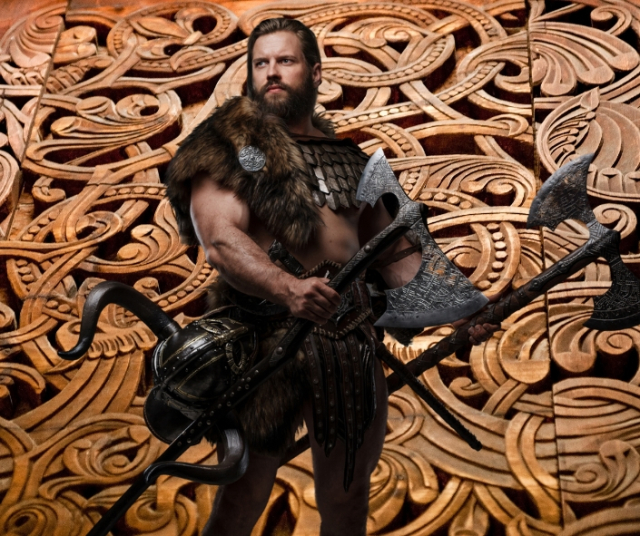Norse mythology, also known as Scandinavian or Germanic mythology, is a vast and rich belief system that comes from the ancient Germanic tribes who inhabited the region of Scandinavia and surrounding areas at the time of the Viking Age. With a rich collection of myths, gods, heroes and mythical creatures, Norse mythology has left an indelible mark on Scandinavian culture and literature, as well as the understanding of the ancient world. Through its stories, Norse mythology offers a fascinating window into the worldview and psyche of ancient Germanic peoples.
Origins and development of Norse mythology.
The origins of Norse mythology can be traced back to the Germanic tribes who inhabited the region of Scandinavia, as well as parts of what is now Germany, Denmark and Norway, during the Iron Age, around the first millennium BC. These tribes had a rich tradition. oral stories and myths that were passed down from generation to generation. Over time, these beliefs consolidated into a more complex and elaborate belief system that reflected the life, beliefs, and experiences of the ancient Germanic peoples.
Norse mythology developed over the centuries, influenced by interactions with other cultures and civilizations, such as Roman and Christian. The arrival of Christianity in the region beginning in the 8th century AD marked the decline of Norse pagan religion, but its legacy persisted through oral literature and, later, through written sagas and other records.
The Eddas, composed by Snorri Sturluson in the 13th century AD, are the main written sources of Norse mythology. The Poetic Edda, dating from the 9th century AD or earlier, is a collection of epic poems that preserve much of Norse mythology in poetic form. The Prose Edda, written by Snorri, is a prose compilation of Norse myths and legends, as well as skaldic poetry. These works have been fundamental to our understanding of Norse mythology and have greatly influenced Scandinavian literature and art.
The gods and goddesses of the Norse pantheon.
The Norse pantheon is rich and varied, full of gods and goddesses who play diverse roles in Norse cosmology and mythology. One of the most prominent gods is Odin, the father of all gods, associated with wisdom, war and death. Odin is known for his quest for knowledge and his sacrifice at the world tree, Yggdrasil, to obtain runic wisdom.
Thor is another important god, son of Odin and considered the protector of humanity and the god of thunder and lightning. He is known for his strength and bravery, as well as his magical hammer, Mjölnir, which he used to defend gods and mortals from the forces of chaos and evil.
Loki, the god of mischief and deception, is a complex character who often causes trouble in the Norse pantheon. Although he sometimes helps the gods with his cunning tricks, he is also responsible for many problems and conflicts.
Other important gods and goddesses include Freyja, the goddess of love and fertility; Freyr, the god of agriculture and prosperity; and Tyr, the god of war and honor. Each of these gods and goddesses has their own role in the Norse pantheon and reflects different aspects of human nature and the cosmos according to Scandinavian mythology.
Heroes and mythical creatures.
Norse mythology is full of legendary heroes and mythical creatures who star in epic stories and face impossible challenges. Among the most famous heroes are Sigurd (or Siegfried), the hero who slew the dragon Fafnir and conquered the treasure of the Nibelungs; Beowulf, the brave warrior who fought the monster Grendel and his mother; and Ragnar Lodbrok, the legendary Viking king who carried out numerous feats and conquests.
As for mythical creatures, Norse mythology is full of supernatural and monstrous beings that represent both the danger and wonder of the ancient world. These creatures include frost giants (jotuns), dwarves (dwarves), elves (álfar), trolls, dragons, and the wolf Fenrir, who plays a crucial role in Ragnarök, the end of the Norse world.
The influence of Norse mythology on modern culture.
Norse mythology has had a lasting influence on Western culture and literature, inspiring numerous works of art, literature, film and music. From the epic sagas of the Vikings to modern reinterpretations in fantasy literature and popular culture, Norse myths and legends continue to capture the imagination of people of all ages and generations.
In literature, Norse mythology has been a source of inspiration for authors such as JRR Tolkien, author of "The Lord of the Rings," and Neil Gaiman, author of "American Gods." In film and television, stories like "Thor" and "Vikings" have brought Norse myths to a global audience. In music, bands such as Led Zeppelin and Amon Amarth have incorporated elements of Norse mythology into their lyrics and musical styles.
In addition to its influence on popular culture, Norse mythology has also left an indelible mark on the way we understand and explore the ancient world. Through its study and appreciation, we can connect with the roots of Scandinavian culture and better understand our own humanity and the world around us. Norse mythology is more than a set of ancient stories; is a living legacy that continues to inspire and amaze people around the world.






